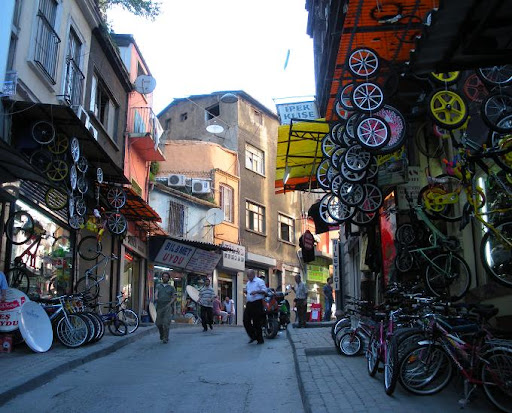We met with Hasan Sermerci (of the inimitable Adnan & Hasan) this afternoon to talk about life and times in the Turkish rug selling industry. This was a fantastic opportunity for us to get all our burning questions answered about a) the mysteries of the Turkish economy, and b) the details of rug manufacture, though I mainly concentrated on 'a' and let my colleagues handle 'b' (which they did with aplomb).
There'd been intermittent discussion of how the Turkish market tended to cluster based on product ('Button Lane', a street of near-identical button stores, was a particular favorite) and how that couldn't possibly be an effective and profitable system. Hasan explained that this allowed the buyer to know exactly where he needed to go to buy a product - if you need a button, you go to Button Lane. Hasan's rug store is itself located on what has been known since time immemorial as the Carpetmaker's Street in the Grand Bazaar.
Two bike shops vying for the perfect niche.

Two thoughts present themselves that may help to explain this phenomenon. Hasan's explanation that it helps buyers know exactly where to go for a product makes complete sense when you consider the informal nature of most of Turkey's economy. Even if some sort of directory currently exists listing Istanbul's carpetmakers, buttonmakers, etc. (and I'd be completely blown away if it did) it couldn't have been around for very long - the market is far too fluid. Having an established district for each product allows producers to access a far wider consumer pool than they possibly could otherwise. In this sense the clusters are beneficial to the producer. Meanwhile, the system goes hand in hand with the institution of haggling - if you don't like a vendor's prices, you pit six adjacent vendors against one another and let them bid down. In this sense the clusters are beneficial to the consumer.
Yet the times may be a-changin. Half of Carpetmaker's Street is now filled with cafes, not rug sellers. Most of Adnan & Hasan's custom comes from foreigners - Turks are going to independent streetside stores that sell lower-quality, often mass-manufactured, goods, but are also significantly cheaper. When Hasan started criticizing the 'Turkish rugs' sold on the street that were actually being machine-made in China, I couldn't help but smile. In experiencing the Wal-Mart Phenomenon, Turkey has officially joined the West.
When I asked about how the dispersion of the market had affected sales, Hasan emphasized that business hadn't suffered because the store depends on buyers coming by word of mouth, not ad hoc. The idea that market dispersion could be a positive thing didn't seem to even occur to him. Maybe he's right - maybe it couldn't.
There'd been intermittent discussion of how the Turkish market tended to cluster based on product ('Button Lane', a street of near-identical button stores, was a particular favorite) and how that couldn't possibly be an effective and profitable system. Hasan explained that this allowed the buyer to know exactly where he needed to go to buy a product - if you need a button, you go to Button Lane. Hasan's rug store is itself located on what has been known since time immemorial as the Carpetmaker's Street in the Grand Bazaar.
Two bike shops vying for the perfect niche.
Two thoughts present themselves that may help to explain this phenomenon. Hasan's explanation that it helps buyers know exactly where to go for a product makes complete sense when you consider the informal nature of most of Turkey's economy. Even if some sort of directory currently exists listing Istanbul's carpetmakers, buttonmakers, etc. (and I'd be completely blown away if it did) it couldn't have been around for very long - the market is far too fluid. Having an established district for each product allows producers to access a far wider consumer pool than they possibly could otherwise. In this sense the clusters are beneficial to the producer. Meanwhile, the system goes hand in hand with the institution of haggling - if you don't like a vendor's prices, you pit six adjacent vendors against one another and let them bid down. In this sense the clusters are beneficial to the consumer.
Yet the times may be a-changin. Half of Carpetmaker's Street is now filled with cafes, not rug sellers. Most of Adnan & Hasan's custom comes from foreigners - Turks are going to independent streetside stores that sell lower-quality, often mass-manufactured, goods, but are also significantly cheaper. When Hasan started criticizing the 'Turkish rugs' sold on the street that were actually being machine-made in China, I couldn't help but smile. In experiencing the Wal-Mart Phenomenon, Turkey has officially joined the West.
When I asked about how the dispersion of the market had affected sales, Hasan emphasized that business hadn't suffered because the store depends on buyers coming by word of mouth, not ad hoc. The idea that market dispersion could be a positive thing didn't seem to even occur to him. Maybe he's right - maybe it couldn't.
1 comment:
kevin,
what's up?!
I'm reading. keep up the good work. looks like a great city. we had a long conversation about you and your exploits at the pettys' house on saturday - the childses and berrys and corinne were all there. mostly, we said nice stuff, ha :)
I hope you're having the time of your life.
matthew
Post a Comment